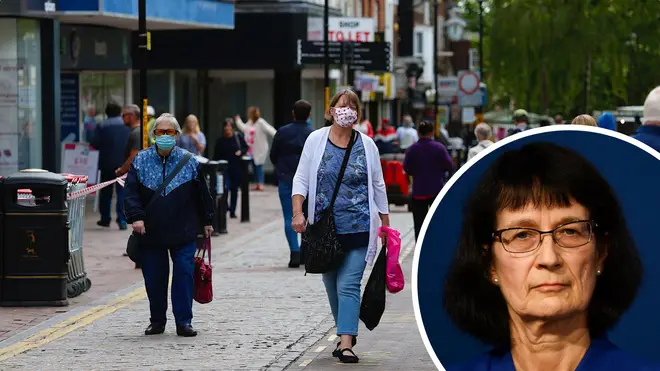
Tom Swarbrick 4pm - 6pm
15 December 2021, 11:20 | Updated: 7 June 2023, 08:56

The Omicron variant of Covid-19 is "probably the most significant threat we've had since the start of the pandemic" and risks putting the NHS in "serious peril", Dr Jenny Harries has warned.
The UK Health Security Agency (UKHSA) chief told the Commons Transport Committee reducing infections was key to protecting the NHS.
"Trying to prevent ingress of any infections, including Omicron, still remains a key point, particularly when we can foresee a very large wave of Omicron coming through and our health services potentially being in serious peril," she said.
She added that the new strain was "probably the most significant threat we've had since the start of the pandemic", citing its transmissibility as a real cause for concern.
Read more: MPs approve mandatory Covid passes despite huge Tory rebellion of nearly 100
Read more: Comedian Jethro dies aged 73 after contracting Covid-19
"The numbers that we see on data over the next few days will be quite staggering compared to the rate of growth that we've seen in cases for previous variants," she told MPs.
"The difficulty is that the growth of this virus, it has a doubling time which is shortening - ie it's doubling faster, growing faster.
"In most regions in the UK it is now under two days. When it started we were estimating about four or five.
"So if you think of that growth rate right across the UK, and we're starting to see it and feel it now in London particularly, but yesterday particularly around Manchester, and we're very sure there are levels growing across most communities in the UK now, although there is quite a lot of regional variation still."

Dr Jenny Harries: UK could see 'staggering' Omicron case numbers
She said that the world's understanding of the variant was at an "early stage" and they were still awaiting information about the strain's clinical severity, and whether they high numbers of cases already being seen will turn into high levels of severe disease, hospitalisations and deaths.
She added "the real risk" of Omicron is that "there are so many unusual mutations on this virus".
"It runs the risk of evading our natural and/or vaccine immunity," she said.
Read more: Vaccine passports for nightclubs and large venues come into force in England
Read more: Cost of goods ‘at highest rate for 12 years’ as inflation hits 5.1%
"We have early studies looking at immune serum from patients who've been ill and been vaccinated, to see that two doses of vaccine against symptomatic infection - so we don't know yet about severe disease but about symptomatic infection - is much reduced.
"We do know that the booster dose will push that right back up but it still comes back to a level below that that we've had with the booster effect for Delta, our previous wave."

Ben Kentish on major Tory rebellion over Covid restrictions
Asked specifically about travel restrictions, Dr Jenny Harries said the thinks they "have a time and place".
"I think what I'm sure committee members have seen this morning is, and I'm strongly supportive of this in public health terms, is that very early restrictions were placed on countries where we had good evidence of high rates of Omicron at a time where we had low knowledge of rates in the UK, as a delaying tactic," she said.
"That gives us time to prepare, to understand, to boost particularly our population, but actually it's really important that where there isn't a benefit, countries are clearly freed from those restrictions.
Read more: Shaun Bailey quits police role after pic shows him grinning at Tory HQ Xmas bash
Read more: Mother and partner to be sentenced for 'cruel' death of one-year-old Star Hobson
"At the moment the rate of growth in the UK, as I've just explained, is now significant, and the benefit of those border controls against particular countries is reduced.
"However, because we now have widespread global cases of Omicron there is still value in preventing that variant or other cases coming into the country when we don't need it to be there, not least because we don't want hospitals to be under any increased pressure than they are currently."

Four hour long queue for booster vaccine in Bristol
On Tuesday the Government decided to remove all countries from the UK's red list.
Read more: All countries removed from red list as measures 'less effective' at stopping Omicron
With Omicron already in general circulation in England, it was decided having the 11 countries on the list - and therefore requiring travellers from them to quarantine upon arrival - was an ineffective way of reducing the spread of the new strain.
"So I can announce today that whilst we'll maintain our temporary testing measures for international travel, we will be removing all 11 countries from the travel red list effective from 4am tomorrow," said Health Secretary Sajid Javid.